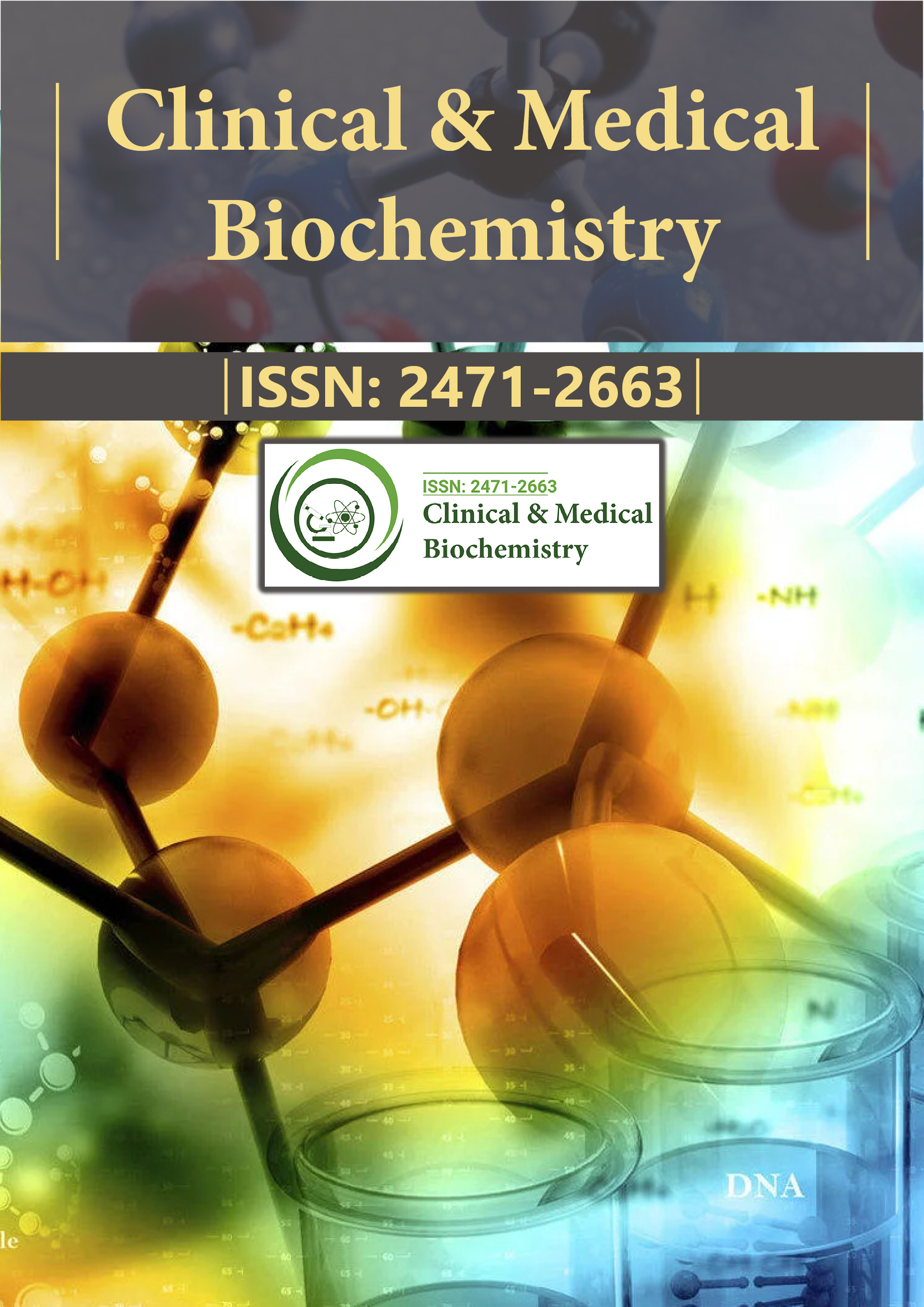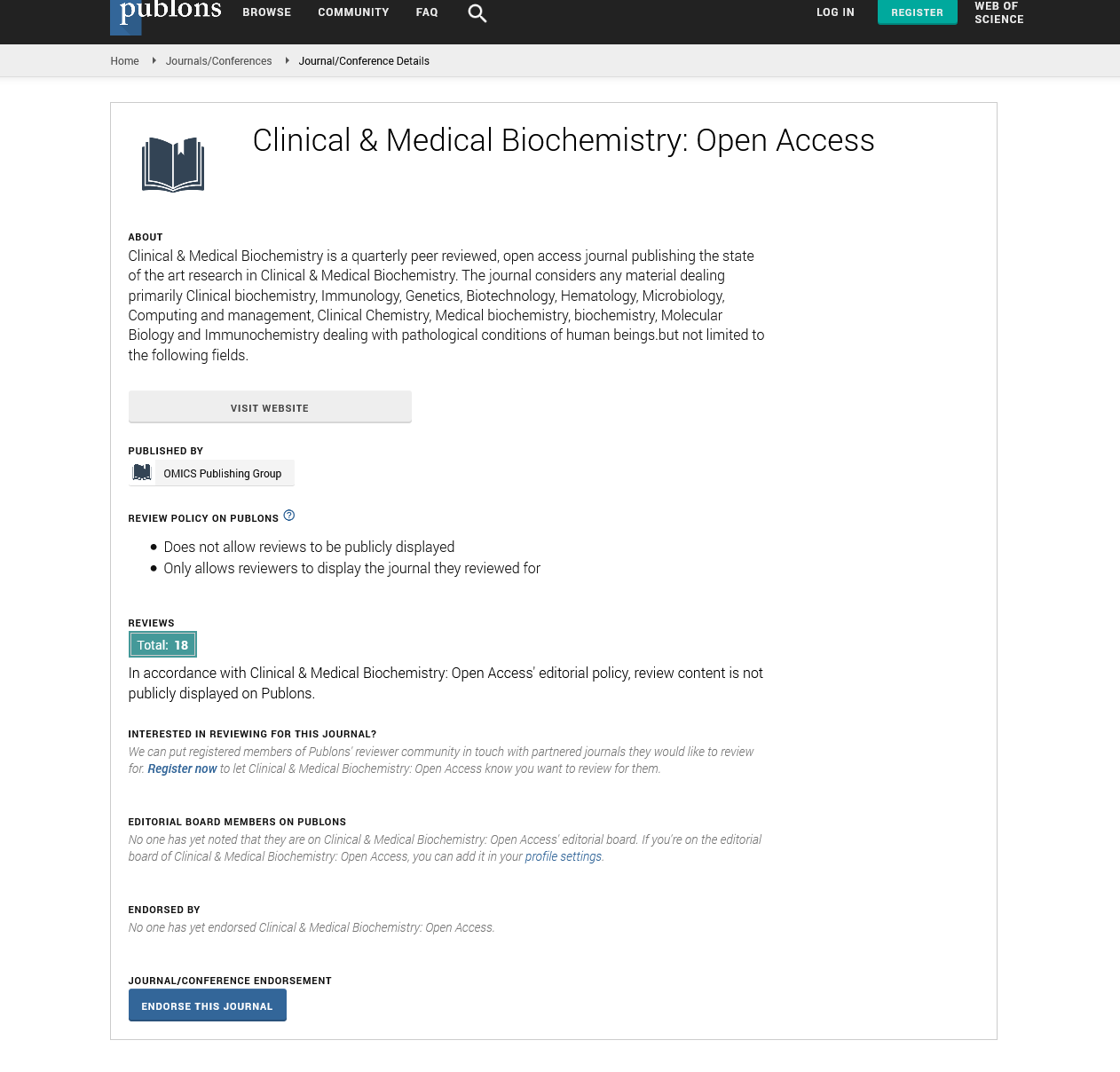Indexed In
- RefSeek
- Directory of Research Journal Indexing (DRJI)
- Hamdard University
- EBSCO A-Z
- OCLC- WorldCat
- Scholarsteer
- Publons
- Euro Pub
- Google Scholar
Useful Links
Share This Page
Journal Flyer

Open Access Journals
- Agri and Aquaculture
- Biochemistry
- Bioinformatics & Systems Biology
- Business & Management
- Chemistry
- Clinical Sciences
- Engineering
- Food & Nutrition
- General Science
- Genetics & Molecular Biology
- Immunology & Microbiology
- Medical Sciences
- Neuroscience & Psychology
- Nursing & Health Care
- Pharmaceutical Sciences
Perspective - (2022) Volume 8, Issue 5
Synthesis and Specificity in Cardiac Enzymes and Creatine Kinase
Marchisio Carlson*Received: 19-Aug-2022, Manuscript No. CMBO-22-18235; Editor assigned: 23-Aug-2022, Pre QC No. CMBO-22-18235 (PQ); Reviewed: 12-Sep-2022, QC No. CMBO-22-18235; Revised: 20-Sep-2022, Manuscript No. CMBO-22-18235 (R); Published: 28-Sep-2022, DOI: 10.35841/2471-2663.22.8.133
Description
Creatin kinase is an enzyme found in skeletal muscle, heart muscle ,brain in the form of cardiac enzymes (cardiac biomarkers). After a cardiac attack, troponin and Creatinine Phosphokinase (CPK) levels increase. Acute coronary syndrome or ischemia may also be indicated by elevated cardiac enzyme levels. To measure cardiac enzymes, medical professionals employ blood tests called enzyme marker assays. The cardiac biomarker levels in the blood are determined by this test. Enzymes, hormones, and proteins are some examples of these markers. After the heart has been put under a lot of stress and has become harmed from not getting enough oxygen, cardiac biomarkers become visible in the blood. This could be the result of a heart attack. These levels, however, may be excessive for other causes. Biomarker concentrations are frequently used to determine the size of a heart attack and how seriously the heart was affected.
Creatine Kinase (CK) and CK-MB
In the majority of the nation, troponin has largely taken the role of CK. It may occasionally be utilized to aid in the early detection of a subsequent heart attack that happens soon after the first. One specific variant of the enzyme creatine kinase, which is mostly present in heart muscle, is called CK-MB. Because CK is found in many tissues, having high levels of CK can indicate a number of disorders. A higher CK-MB may more clearly indicate heart disease. When cell membranes are damaged by hypoxia, CK is released from the cytosol and enters the bloodstream. On this basis, elevated serum levels of CK have been used as a sensitive but nonspecific test for myocardial infarction. The poor specificity is due to the ubiquity of CK in tissues other than the myocardium.
Mechanism
Total CK level determination suffers from a lack of precision.Significant CK increase may be caused by trauma, surgery, vascular illness, and metabolic disorders of the central nervous system. Similar to how injuries can increase the CK levels, a number of muscle disorders-including metabolic diseases like myxedema and diabetic ketoacidosis-inflammatory diseases like polymyositis, and degenerative diseases like Duchenne's muscular dystrophy-can also do so.
When subjected to electrophoresis, the serum of healthy people is mostly made up of CK-MM isoenzyme. Traces of CK-MB and CK-BB can be found using sensitive technique. Cytosolic CKMB can be released by any procedure that damages the cardiac sarcolemmal membranes, such as myocarditis, cardiac trauma, or cardiac surgery with endomyocardial biopsy. Therefore, elevated serum levels of CK-MB are exclusive to myocardial cellular damage rather than acute myocardial infarction. Within 3 to 6 hours of the commencement of myocardial infarction symptoms, serum levels of CK and CK-MB rise; the highest levels are reached between 16 and 30 hours later. It is noteworthy that CKMB leaves the serum more quickly than CK. For instance, increased CK levels can be noticed for up to 60 hours whereas CK-MB returns to normal within 24 to 36 hours.
Conclusion
Any physical harm to the heart muscles caused by trauma, inflammation, surgery, and ischemia can also cause an increase in CK MB levels (decreased oxygen). Kidney failure might also be the cause of high CK MB levels. Exercises that are difficult can also raise CK levels, although the CK-MB stays low in that situation. Rarely, an increase in CK MB levels might be brought on by chronic muscle illness, alcoholism, and low thyroid hormone levels. Infections, illnesses, and medications that harm or inflame the muscles are some other reasons that might cause the release of CK MB into the blood.
Citation: Carlson M (2022) Synthesis and Specificity in Cardiac Enzymes and Creatine Kinase. Clin Med Bio Chem. 8:133.
Copyright: © 2022 Carlson M. This is an open-access article distributed under the terms of the Creative Commons Attribution License, which permits unrestricted use, distribution, and reproduction in any medium, provided the original author and source are credited.

